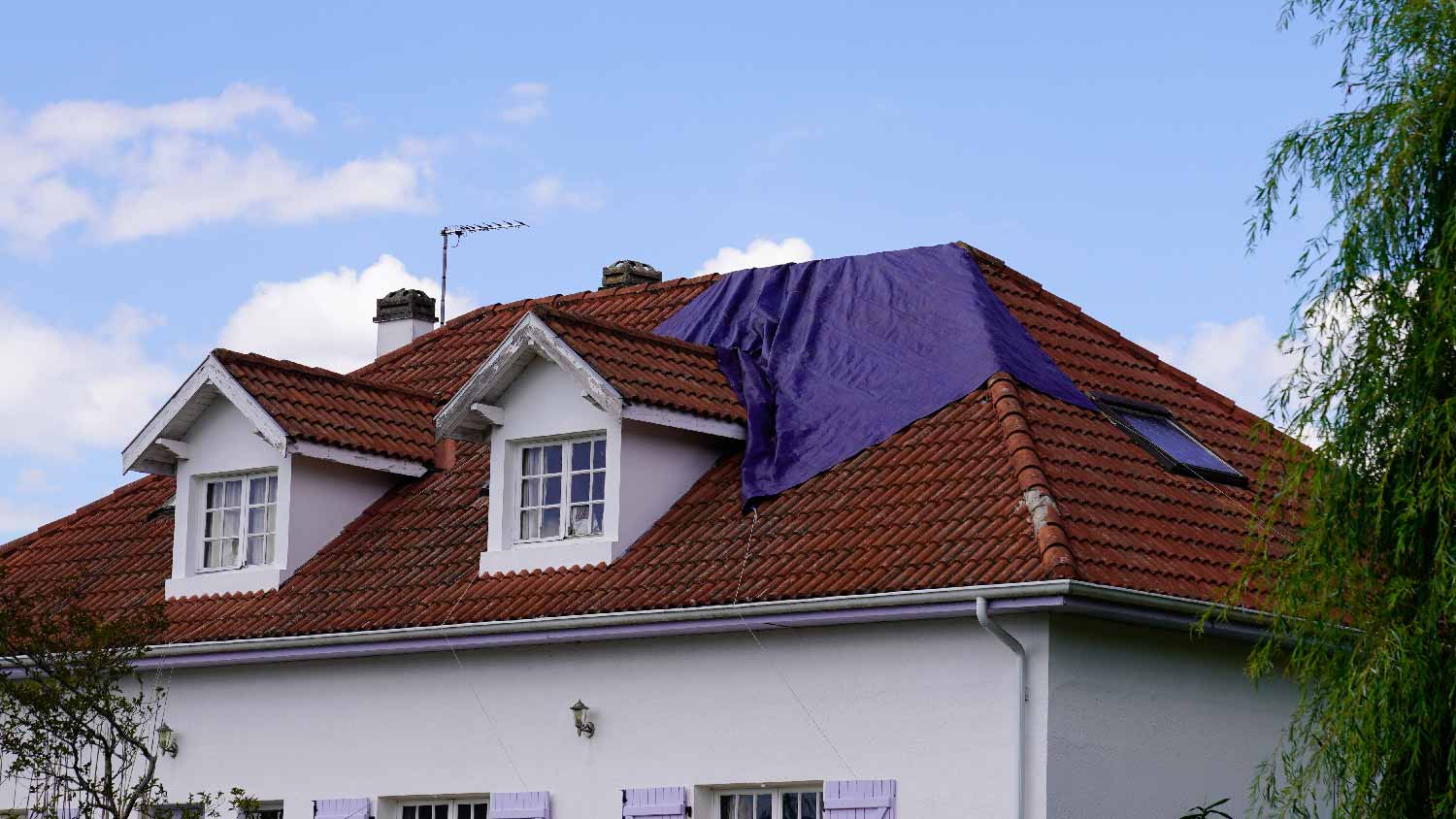How Much Does It Cost to Tarp a Roof? [2025 Data]
The average cost to tarp a roof is $450, with most homeowners spending between $150 and $3,300. Costs depend on the size of your repair.


The roof shape and area size play the largest role in roof tarping cost, although tarp thickness is a key consideration, too.
DIY installation can save on labor costs, but due to safety considerations, it’s best to hire a roofing professional.
Tarping a roof is a crucial step in many other tasks, such installing a skylight or cutting down a tree.
If it’s part of an insurance-covered repair, you may not have to pay anything out of pocket to tarp your roof.
The average cost to tarp a roof is $450, but you can expect to pay anywhere from $150 to $3,300 depending on several factors, like the size of the damaged area and whether or not you need an emergency service. Let's walk through your DIY and professional options when installing a tarp across a small or large section of your roof.
Cost Factors to Tarp a Roof
There are a few key factors that affect how much you’ll end up paying to tarp your roof.
Roof and Area Size
The cost to tarp a roof depends largely on the square footage you need to cover. Professionals almost always use a per-square-foot price to determine the cost while also considering the other factors below. You can expect to pay between $0.70 and $2.80 per square foot to tarp a roof.
The lower end of this range—between $0.70 and $2.00 per square foot—accounts for standard professional jobs and larger jobs, where the per-square-foot price is often discounted a bit due to the size of the job. You'll pay between $1.00 and $2.80 for last-minute emergency services, as well as for smaller jobs. Keep in mind that these prices include professional labor costs.
| Tarp Size (sq. ft.) | Cost Range |
|---|---|
| 35 | $100–$150 |
| 48 | $150–$200 |
| 80 | $175–$225 |
| 120 | $200–$340 |
| 192 | $225–$540 |
| 600 | $420–$1,700 |
| 1,200 | $840–$3,360 |
| 1,500 | $1,050–$4,200 |
| 2,050 | $1,440–$5,800 |
| 3,000 | $2,100–$8,400 |
Standard vs. Emergency Tarping
Roofers will charge rush and emergency fees for tarping a roof in extreme scenarios. If a branch, snow, or strong winds damage your roof in a storm, you will need to tarp the roof as soon as it’s safe to do so. Emergency roofing professionals will charge between $1.00 and $2.80 per square foot for rush services. Whenever possible, be sure to take photos of roof damage before tarping the roof—and after the storm has passed—for insurance purposes.
| Scenario | Cost Range (For 1,500 square feet) |
|---|---|
| Small DIY tarping | $150–$450 |
| Standard professional tarping | $1,050–$3,000 |
| Emergency professional tarping | $1,500–$4,200 |
Tarp Thickness
Tarps come in a range of materials and thicknesses measured in mils, or one-thousandth of an inch. Tarps used for covering openings in roofs often fall between 10 and 25 mils.
Thinner tarps between 10 and 15 mils may be suitable for tarping roofs in areas that don’t see a lot of extreme weather and aren’t at risk of fallen tree limbs or sharp tree debris. They’re more affordable, but they won’t last as long, so they’re better as short-term solutions. Thicker tarps between 15 and 25 mils are better if you expect a delay between tarping and when you can carry out a more permanent solution, or in areas prone to severe weather.
Roof Design
Whenever you hire a professional to repair your roof, they will adjust their price based on your roof’s slope, accessibility, and other design details. Roofs with steep pitches, dormer windows, or multiple ridges may cost more to tarp, in large part because working around bumpouts and other design features will take longer and use more materials. Contractors will need to trim and shape the tarp to accommodate features such as chimneys and vents.
Labor

Professional roofers charge between $45 and $75 an hour whether they’re tarping or installing new roofing. Between $0.60 and $2.50 of the per-square-foot cost will account for labor prices. Since this is a large percentage of your bottom line, it might be tempting to tarp the roof yourself, but hiring a professional who can tarp your roof properly could actually save you money by ensuring no water gets through.
Materials
Labor aside, you'll pay between $0.10 and $0.30 per square foot for the tarp itself, depending on the thickness and square footage. Prices will also depend on the materials needed to secure your tarp. Your professional may need cap nails, wooden battens, or waterproof tape to keep the tarp in place. The extent of the materials needed to secure the tarp depends on the roof's slope and your local weather. Areas with high winds and rains require more extensive installation than areas without expected storms.
Accessibility
Your roof’s accessibility will play a crucial role in your costs, as well, as roofs that are very steep or harder to access will require special equipment or safety gear to navigate safely, which can drive up your labor costs. Your roof material can also affect accessibility, as asphalt roofs offer good grip and can be safe to walk on even with a steeper pitch. Slick metal roofs don’t offer the same level of safety, so you may pay more for tarp installation on a steep metal roof.
DIY Roof Tarping vs. Hiring a Pro
While tarping your roof yourself might be tempting, it’s best to leave this one to the pros. Not only is doing any work on a roof dangerous, but improper tarping can lead to ongoing roof leaks and expensive water damage in your home. Plus, if your roof is suffering from severe damage, it may be unsafe to walk on, which means the job requires a pro.
If you’re in a pinch and need to tarp your roof immediately, call an emergency roofing company near you to see if they can do the job rather than trying to tackle the work yourself.
Roof tarps should only be used temporarily, as most only last safely for about 90 days. After that, you should address the needed repairs or replace the tarp.
Common Roof Tarping Add-Ons

Tarping a roof often means that related repairs are on the docket. Damaged shingles, holes from storm damage, or fun renovations such as bringing in the pros to install a skylight are just a few jobs you should consider if you’re already having someone tarp your roof.
Tree removal cost: $200–$2,000
Roof inspection cost: $125–360
Cost of roof repairs: $390–$1,930
Roof replacement cost: $5,900–$13,200
Cost to remediate water damage: $1,400–$6,300
How to Save Money on the Cost to Tarp a Roof
Roof tarping can be an expensive project, costing as much as $8,400 in some cases. There are a few things you can do to keep costs to a minimum, though.
Buy materials yourself. Purchasing a tarp from a local hardware store yourself before calling a professional can avoid upcharges for materials from your expert. Purchase all necessary hardware to secure the tarp ahead of time, too.
Avoid roof tarping in the first place. Have a roof inspection done once a year to avoid emergency roof tarping services. The inspection will cost around $230, on average, but that can pale in comparison to the cost of emergency tarping and repair costs.
Avoid emergencies. Whenever possible, schedule roof tarping in advance rather than calling for emergency services. If you’re able to implement another temporary solution while you wait for tarping, you could save an average of $500.
Shop around for the best deal. Meet with at least three local roofers to compare prices and add-ons before signing a contract.
How Angi Gets Its Cost Data
Home is the most important place on earth, which is why Angi has helped more than 150 million homeowners transform their houses into homes they adore. To help homeowners with their next project, Angi provides readers with the most accurate cost data and upholds strict editorial standards. We extensively research project costs to develop the pricing data you see, so you can make the best decisions for you and your home. We rely on reputable sources, including the U.S. Bureau of Labor Statistics, academic journals, market studies, and interviews with industry experts—all to ensure our prices reflect real-world projects.
Want to help us improve our cost data? Send us a recent project quote to costquotes@angi.com. Quotes and personal information will not be shared publicly.
Frequently Asked Questions
High-quality tarps can last up to 90 days on your roof if properly secured. Keep in mind that thinner tarps, or those exposed to heavy wind and rains, may not last the full three months, so it's important to keep an eye on the tarp to ensure it’s standing up to the elements.
A tarp can temporarily stop a roof leak, but how long the solution works heavily depends on the placement and size of the leak. While a tarp can be a temporary solution, it’s crucial to have a professional inspect and repair the leak as soon as possible to implement a permanent fix.
Homeowners insurance may cover the cost to tarp a roof if the type of damage falls within your coverage. For example, roof damage caused by a natural disaster may fall within your plan, and the cost of a temporary tarp may be incorporated. In general, however, simply tarping your roof for renovations will often not fall under insurance coverage.





- Roofers
- Metal Roofing
- Roof Repair
- Roof Inspection
- Vinyl Siding Repair Contractors
- Flat Roofing Companies
- Commercial Roofing
- Emergency Roofing Companies
- Leaky Roof Repair
- Metal Roof Repair
- Business Roof Repair
- Flat Roof Repair
- Tile Roof Repair
- Slate Roofers
- Rubber Roofers
- Roofing & Siding
- Metal Roof Installation
- Affordable Roofing
- Roof Sealing
- Attic Ventilation Contractors











